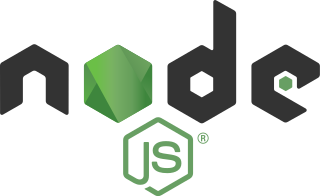
NetBeans is an integrated development environment (IDE) for Java. NetBeans allows applications to be developed from a set of modular software components called modules. NetBeans runs on Windows, macOS, Linux and Solaris. In addition to Java development, it has extensions for other languages like PHP, C, C++, HTML5, and JavaScript. Applications based on NetBeans, including the NetBeans IDE, can be extended by third party developers.

Dojo Toolkit is an open-source modular JavaScript library designed to ease the rapid development of cross-platform, JavaScript/Ajax-based applications and web sites. It was started by Alex Russell, Dylan Schiemann, David Schontzler, and others in 2004 and is dual-licensed under the modified BSD license or the Academic Free License.
TypeScript is a free and open source programming language developed and maintained by Microsoft. It is a strict syntactical superset of JavaScript and adds optional static typing to the language. It is designed for the development of large applications and transpiles to JavaScript. As it is a superset of JavaScript, existing JavaScript programs are also valid TypeScript programs.

Ext JS is a JavaScript application framework for building interactive cross-platform web applications using techniques such as Ajax, DHTML and DOM scripting. It can be used as a simple component framework but also as a full framework for building single-page applications (SPAs).

Node.js is an open-source, cross-platform, back-end JavaScript runtime environment that runs on a JavaScript Engine and executes JavaScript code outside a web browser, which was designed to build scalable network applications. Node.js lets developers use JavaScript to write command line tools and for server-side scripting—running scripts server-side to produce dynamic web page content before the page is sent to the user's web browser. Consequently, Node.js represents a "JavaScript everywhere" paradigm, unifying web-application development around a single programming language, rather than different languages for server-side and client-side scripts.

npm is a package manager for the JavaScript programming language maintained by npm, Inc. npm is the default package manager for the JavaScript runtime environment Node.js. It consists of a command line client, also called npm, and an online database of public and paid-for private packages, called the npm registry. The registry is accessed via the client, and the available packages can be browsed and searched via the npm website. The package manager and the registry are managed by npm, Inc.

Amber Smalltalk, formerly named Jtalk, is an implementation of the Smalltalk-80 language that runs on the JavaScript runtime of a web browser. It is designed to enable client-side development using the Smalltalk programming language. The programming environment in Amber is named Helios.
Yeoman is an open source client-side scaffolding tool for web applications. Yeoman runs as a command-line interface written for Node.js and combines several functions into one place, such as generating a starter template, managing dependencies, running unit tests, providing a local development server, and optimizing production code for deployment.
MontageJS is an open-source JavaScript framework for building scalable single-page applications. It aims to simplify the development and maintainability of expressive HTML5 applications by employing native application frameworks. With Montage, developers can build and extend reusable user interface components and modules, bind properties among components and controllers, and synchronize DOM updates to ensure a smooth user experience, especially on resource-constrained devices.
The Windows Library for JavaScript is an open-source JavaScript library developed by Microsoft. It has been designed with the primary goal of easing development of Windows Store apps for Windows 8 and Windows 10, as well as Windows Phone apps for Windows Phone 8.1, Windows 10 Mobile and Xbox One applications using HTML5 and JavaScript, as an alternative to using WinRT XAML and C#, VB.NET or C++ (CX).

Webpack is a free and open-source module bundler for JavaScript. It is made primarily for JavaScript, but it can transform front-end assets such as HTML, CSS, and images if the corresponding loaders are included. Webpack takes modules with dependencies and generates static assets representing those modules.
NativeScript is an open-source framework to develop mobile apps on the Apple iOS and Android platforms. It was originally conceived and developed by Progress. At the end of 2019 responsibility for the NativeScript project was taken over by long-time Progress partner, nStudio. In December 2020 nStudio also oversaw the induction of NativeScript into OpenJS Foundation as an Incubating Project. NativeScript apps are built using JavaScript, or by using any programming language that transpiles to JavaScript, such as TypeScript. NativeScript supports the Angular and Vue JavaScript frameworks. Mobile applications built with NativeScript result in fully native apps, which use the same APIs as if they were developed in Xcode or Android Studio. Additionally, software developers can re-purpose third-party libraries from CocoaPods, Maven, and npm.js in their mobile applications without the need for wrappers.
gulp is an open-source JavaScript toolkit created by Eric Schoffstall used as a streaming build system in front-end web development.
Grunt is a JavaScript task runner, a tool used to automatically perform frequent tasks such as minification, compilation, unit testing, and linting. It uses a command-line interface to run custom tasks defined in a file. Grunt was created by Ben Alman and is written in Node.js. It is distributed via npm. As of October 2022, there were more than 6,000 plugins available in the Grunt ecosystem.

In computing, Hoodie is an open-source JavaScript package, that enables offline first, Front-end web development by providing a complete backend infrastructure. It aims to allow developers to rapidly develop web applications using only front-end code by providing a backend based on Node.js and Apache CouchDB. It runs on many Unix-like systems as well as on Microsoft Windows.

Yarn is a software packaging system developed in 2016 by Facebook for the Node.js JavaScript runtime environment. An alternative to the npm package manager, Yarn was created as a collaboration of Facebook, Exponent, Google, and Tilde to solve consistency, security, and performance problems with large codebases.
Next.js is an open-source web development framework created by Vercel enabling React-based web applications with server-side rendering and generating static websites. React documentation mentions Next.js among "Recommended Toolchains" advising it to developers as a solution when "Building a server-rendered website with Node.js". Where traditional React apps can only render their content in the client-side browser, Next.js extends this functionality to include applications rendered on the server-side.

Deno is a runtime for JavaScript, TypeScript, and WebAssembly that is based on the V8 JavaScript engine and the Rust programming language. Deno was co-created by Ryan Dahl, who also created Node.js.

AssemblyScript is a TypeScript-based programming language that is optimized for, and statically compiled to, WebAssembly. Resembling ECMAScript and JavaScript, but with static types, the language is developed by the AssemblyScript Project with contributions from the AssemblyScript community.
peacenotwar is a piece of malware/Protestware created by Brandon Nozaki Miller. In March 2022, it was added as a dependency in an update for node-ipc, a common JavaScript dependency.











